المراقبة والتقييم
لا تتعلق معظم تحديات الرصد والتقييم، مثل الافتقار إلى الاستثمار والقدرات الكافية، تحديدًا بالمساعدات النقدية والقسائم. لكن تلك التي تتعلق في المقام الأول برصد نتائج عمليات النقل غير المقيدة. ويمكن أن تجعل مرونة التحويلات النقدية من الصعب تحديد مؤشرات النتائج المناسبة، لأنها قد تتضمن مجموعة من المؤشرات القطاعية والشاملة. وفي الوقت نفسه، هناك قيود على جمع بيانات دقيقة حول كيفية إنفاق التحويلات النقدية.
التزم الموقعون على الصفقة الكبرى بضمان وجود آليات الرصد والتقييم ذات الصلة فيما يتعلق بالنقد، وزيادة فهم التكاليف والفوائد والآثار والمخاطر المتعلقة بالنقد بالنسبة للطرائق الأخرى. بناءً على ذلك، يحتوي مسار الصفقة الكبرى على نقاط عمل بما في ذلك تطوير مؤشرات نتائج مشتركة للمساعدات النقدية متعددة الأغراض، ومقاييس لتحليل القيمة مقابل المال. تم تقييد التحليل المنهجي للقيمة مقابل المال بسبب عوامل تشمل عدم وجود نهج متفق عليها، والحاجة إلى بيانات نتائج عالية الجودة، وطبيعة التحليل.
الأولويات الحالية
في إطار الالتزامات النقدية للصفقة الكبرى، شاركت شبكة CALP (مع الوكالة الأمريكية للتنمية الدولية وخدمات الإغاثة الكاثوليكية) في تطوير مؤشرات النتائج للمساعدات النقدية متعددة الأغراض. وتُتاح مسودة الاختبار حاليًا باللغات الإنجليزية والفرنسية والإسبانية عبر مكتبة شبكة CALP.
Related initiatives
Featured content

Multipurpose Cash Outcome Indicators – Final Draft for Testing
Guidelines and Tools
Note that the MPC indicators have now been revised. Please click here to access the updated Multipurpose Outcome Indicators and Guidance, which is available in Arabic, English, French and Spanish. Multipurpose Cash Outcome Indicators – Final Draft for Testing Multipurpose cash (MPC) is a type of assistance intended to enable people to meet their basic needs through local...

Monitoring 4 CTP: Monitoring Guidance for CTP in Emergencies
Guidelines and Tools
This guidance provides a central resource to promote a common understanding of the most important monitoring considerations for humanitarian projects using cash transfer programming (CTP). The primary audience for this guidance is field-level practitioners, from organisations directly involved in the design, implementation, monitoring, and accountability of projects using cash and vouchers...

Cost-Efficiency Analysis of Basic Needs Programs: Best Practice Guidance for Humanitarian Agencies
Guidelines and Tools
The Efficiency, Effectiveness and Value for Money Sub-Workstream is pleased to share the final output on Cost-Efficiency Analysis of Basic Needs Programs: Best Practice Guidance for Humanitarian Agencies (attached).
Cost-efficiency analysis estimates the ratio of program costs to outputs created, allowing you to compare cost-per-output for programs which all produced the same output. Such...
Thematic lead
Latest

Guide for Protection in Cash based Interventions
Guidelines and Tools
This guide identifies minimum necessary information and key resources needed to help humanitarian practitioners ensure that protection risks and benefits are considered and monitored throughout the cash-based interventions (CBI) program cycle, using a community-based approach and participatory methods as...

The CALP Network At A Glance
Guidelines and Tools
The CALP Network is a global partnership of humanitarian actors engaged in policy, practice and research within cash transfer programming (CTP). Formed of a community of practice including over 150 organisations and more than 5,000 individuals in the humanitarian sector, the CALP Network is based on...
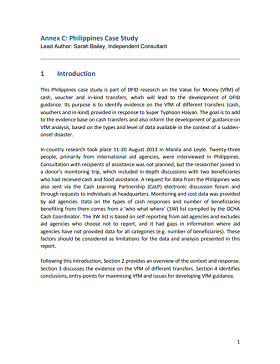
Annex C: Philippines Case Study
Report
This Philippines case study is part of DFID research on the Value for Money (VfM) of cash, voucher and in-kind transfers, which will lead to the development of DFID guidance. Its purpose is to identify evidence on the VfM of different transfers (cash, vouchers and in-kind) provided in response to Super...
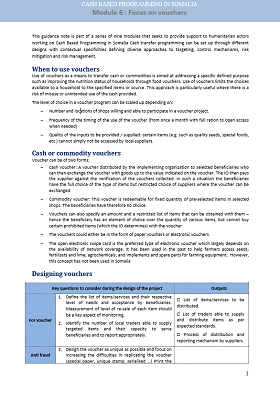
Cash Based Programming In Somalia – Module 6: Focus On Vouchers
Report
This guidance note is part of a series of nine modules that seeks to provide support to humanitarian actors working on Cash Based Programming in Somalia Cash transfer programming can be set up through different designs with contextual specificities defining diverse approaches to targeting, control...

A Review of Evidence of Humanitarian Cash Transfer Programming in Urban Areas: Annexes
Report
Annexes to accompany the working paper ‘A review of evidence
of humanitarian cash transfer programming in urban areas”
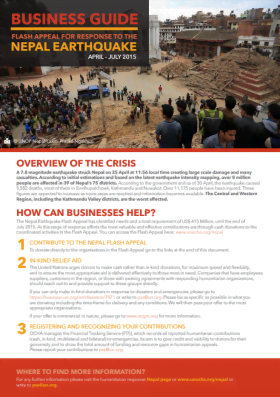
Business Guide – Flash appeal for response to the Nepal earthquake
Policy paper
An overview of the main humanitarian issues facing Nepal following the 2015 Earthquake, as well as indicators as to how businesses can assist with disaster response.

Guidance Notes: Cash Transfers in Livelihoods Programming- West Africa
Guidelines and Tools
A growing acceptance of cash transfers as an inter-sectorial tool is accompanied by a better understanding of this approach and its potential to break the cycle of poverty, after much discussion on the role cash transfers have to play in building resilience. In the Sahel, food security experts have...

Philippines Haiyan Response – A multi-sectoral review of the use of market analysis and the design and implementation of CTPs
Report
Following Typhoon Haiyan, which hit the Philippines on November 8 2014, at least 45 aid agencies chose to implement Cash Transfer Programming (CTP) to assist the more than 16 million people affected. Cash transfers were a logical approach in a country with developed market systems, strong financial...
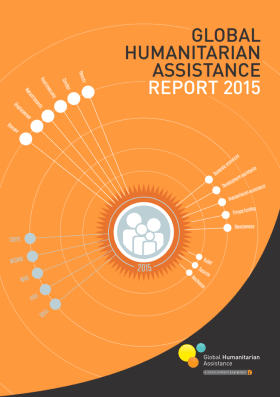
Global Humanitarian Assistance Report 2015
Report
Humanitarian financing is in the spotlight like never before. An extraordinary combination of crises continues to test international, national and local capacity to prevent, prepare and respond as needs continue to outstrip available resources. Global processes taking place during 2015 and 2016 –...

Financial Services Primer for Humanitarians
Guidelines and Tools
Financial services facilitate a wide range of economic and households activities in any society. They enable trade and business expansion and allow individuals to save, send and borrow money. Humanitarian cash transfers, particularly when delivered electronically,can expand access to financial services...

Cost-Effectiveness Analysis of Cash-Based Food Assistance Projects: A case study and discussion paper of findings in Niger
Report
Despite recent and expanding literature on cost effectiveness and value for money, there is little by way of guidance for the implementation of cost-effectiveness analysis in humanitarian and development programming. This report distills findings from the literature on ex post cost-effectiveness analysis,...

Protection Risks and Benefits Analysis Tool
Report
This tool provides global evidence on the protection risks and benefits of cash-based interventions, divided into key protection areas. It outlines the key questions that practitioners should explore to reach a context-specific, participatory identification of protection risks and benefits of a given...
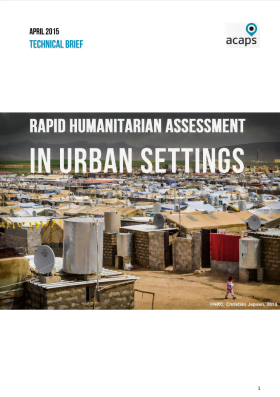
Rapid Humanitarian Assessment in Urban Settings
Guidelines and Tools
This Technical Brief is intended to be a starting point for improving coordinated needs assessments in urban areas, without which the humanitarian community will not be able to ensure the quality and accountability of urban response itself. It provides guidance on carrying out joint rapid assessments of...

Impact of Multipurpose Cash Assistance on Outcomes for Children in Lebanon
Report
This report examines the impact of multipurpose cash assistance (MCA) on children, specifically looking at child outcomes and child protection outcomes, in Lebanon. The impact of the Lebanon Cash Consortium MCA program was measured using a variety of indicators for shelter quality and consistency, child...

Exploring Food Assistance Programmes: Evidence for Lebanon
Report
The purpose of this study is to analyse how markets in Lebanon have responded to the increased demand from the Syrian refugees. More specifically, the study focuses on the micro-level impacts of market-based food assistance on the market supply chains and market performance. It explores the pros and cons...

Integrating Gender throughout a Project’s Life cycle 2.0: A Guidance Document for International Development Organisations and Practitioners
Guidelines and Tools
The overarching premise of this document is that to conduct effective, responsible development work, incorporating gender at all stages of a project’s life cycle – from project design and proposal development to field implementation and monitoring, evaluation and learning – is critical. As such,...
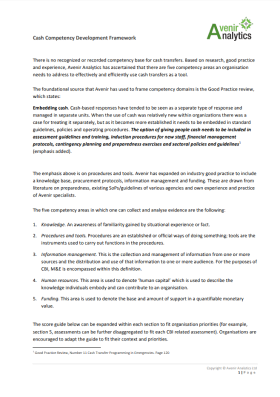
Cash Competency Development Framework
Guidelines and Tools
There is no recognized or recorded competency base for cash transfers. Based on research, good practice and experience, Avenir Analytics has ascertained that there are five competency areas as an organisation needs to address to effectively and efficiently use cash transfers as a tool.
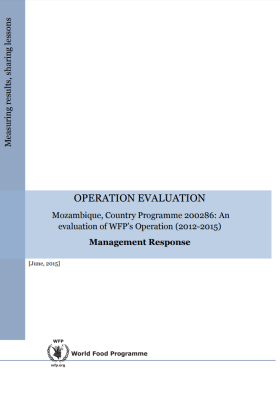
Mozambique, Country Programme 200286: An evaluation of WFP’s operation (2012-2015) – Management Response
Report
The final evaluation covers WFP’s country programme (CP) 200286 (2012-2015). It was intended for both accountability and learning purposes and focuses on assessing: the appropriateness and coherence of the operation its results the factors explaining the results. The evaluation assessed the...

Cash in Emergencies Toolkit
Guidelines and Tools
Access Toolkit Here Cash transfer based programming (CTP) is an effective and flexible way to support people affected by emergencies, maintaining their dignity and choice, while fostering local economies. CTP includes all forms of cash and voucher-based assistance. The Cash in Emergencies Toolkit has been...

Tips for Protection in Cash based interventions
Guidelines and Tools
This document presents a set of general tips to identify, monitor and mitigate protection risks and maximize protection benefits of cash-based interventions.
